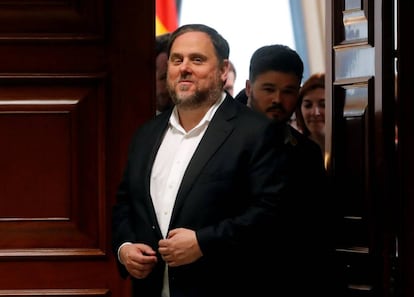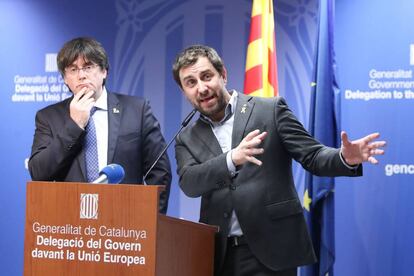EU court ruling on jailed Catalan politician complicates investiture talks
The decision, which found that Oriol Junqueras should have been considered an MEP as soon as he was elected, has immediate consequences on talks between the Socialist Party and the ERC

A ruling made public yesterday by the Court of Justice of the European Union (CJEU) that found that the jailed leader of the Catalan Republican Left (ERC), Oriol Junqueras, became a Member of the European Parliament (MEP) as soon as he was elected, and thus enjoyed parliamentary immunity from that moment on, has had immediate consequences on the negotiations between his party and the Socialists (PSOE) over a possible investiture debate that would see caretaker Prime Minister Pedro Sánchez voted back into office.
There will be no more meetings until there is an opinion from the PSOE and the solicitor general’s office
ERC spokesperson Marta Vilalta
Talks have been ongoing between the ERC and the PSOE, given that the latter needs the abstention of the former at an investiture vote in order to form a government. The PSOE won the repeat general election on November 10, but as at the poll earlier in the year fell short of a majority. ERC has now decided to put the talks on hold until the PSOE sets out its position on the CJEU ruling.
Junqueras was one of a dozen or so politicians and civil association leaders put on trial for his role in the 2017 independence drive in the northeastern Spanish region of Catalonia, which saw an illegal referendum take place on October 1, and a subsequent unilateral declaration of independence passed by the regional government later that month. Junqueras and a number of the other defendants were held in custody both ahead of and during the trial. Nine of the defendants were jailed by the Supreme Court after being found guilty of several offenses, including sedition and the misuse of funds.
The ERC leader did, however, run in the European elections of May this year, and was elected as an MEP. But he was not permitted to leave custody to be sworn into the role. His appeal on this restriction was the basis of the case the CJEU has just ruled on. The Supreme Court will now have to analyze the ruling and make a decision on whether Junqueras should be released to take up his place in the European Parliament. This decision is not likely to come until at least January 7, given the various holiday days over the Christmas period.

The caretaker deputy prime minister, Carmen Calvo, said on Thursday that she trusted the ruling would not affect the investiture and said that the two sides should return to the political route. In her opinion, the ERC should understand that the situation “is something that the government inherited from its predecessor,” in reference to the Popular Party (PP) administration of Mariano Rajoy, which was in power at the time of the independence drive and reacted to the unilateral declaration of independence by suspending the region’s autonomous powers and sacking the government, in which Junqueras was deputy regional premier.
Also speaking on Thursday, ERC spokesperson Marta Vilalta said that the ruling “is the opportunity that the Socialists have to demonstrate that the judicial route and repression is over and that the political route has begun.” She added that there “will be no more meetings until there is an opinion from the PSOE and the solicitor general’s office, which everyone knows answers to the government.”
Carles Puigdemont
Thursday’s ruling has also had an effect on the situation of Carles Puigdemont, who was the regional premier during the 2017 independence drive and fled Spain to avoid arrest after being ousted from his role. Puigdemont, who has been living in Belgium, was also elected as an MEP at the May polls but, like Junqueras, was unable to take up his seat. A number of attempts have been made by the Spanish justice system to have Puigdemont extradited to Spain to face the justice system but all of these have so far failed.

The Catalan politician received the news of the ruling on Thursday with jubilation, and the European Parliament is reported to be preparing the necessary administrative procedures to recognize both him and another of his former colleagues who also left Spain, Toni Comín, as MEPs. This would give them both the right to occupy their seats. That said, the administrative division of the European Parliament will close earlier than usual today due to the Christmas break, and activity in the chamber will not restart until January 6.
Sources close to Puigdemont and Comín said that the pair are likely to make an appearance at the European Parliament today in order to begin the first administrative steps. Five months ago, in July, neither of the politicians were even permitted to enter the Parliament building in order to request temporary accreditation as MEPs-elect. Shortly after, their access was completely blocked due to the reactivation of a European arrest warrant against them by the Spanish justice system.
With reporting by Àngels Piñol, Carlos E. Cué and Bernardo de Miguel.
English version by Simon Hunter.
Tu suscripción se está usando en otro dispositivo
¿Quieres añadir otro usuario a tu suscripción?
Si continúas leyendo en este dispositivo, no se podrá leer en el otro.
FlechaTu suscripción se está usando en otro dispositivo y solo puedes acceder a EL PAÍS desde un dispositivo a la vez.
Si quieres compartir tu cuenta, cambia tu suscripción a la modalidad Premium, así podrás añadir otro usuario. Cada uno accederá con su propia cuenta de email, lo que os permitirá personalizar vuestra experiencia en EL PAÍS.
¿Tienes una suscripción de empresa? Accede aquí para contratar más cuentas.
En el caso de no saber quién está usando tu cuenta, te recomendamos cambiar tu contraseña aquí.
Si decides continuar compartiendo tu cuenta, este mensaje se mostrará en tu dispositivo y en el de la otra persona que está usando tu cuenta de forma indefinida, afectando a tu experiencia de lectura. Puedes consultar aquí los términos y condiciones de la suscripción digital.








































